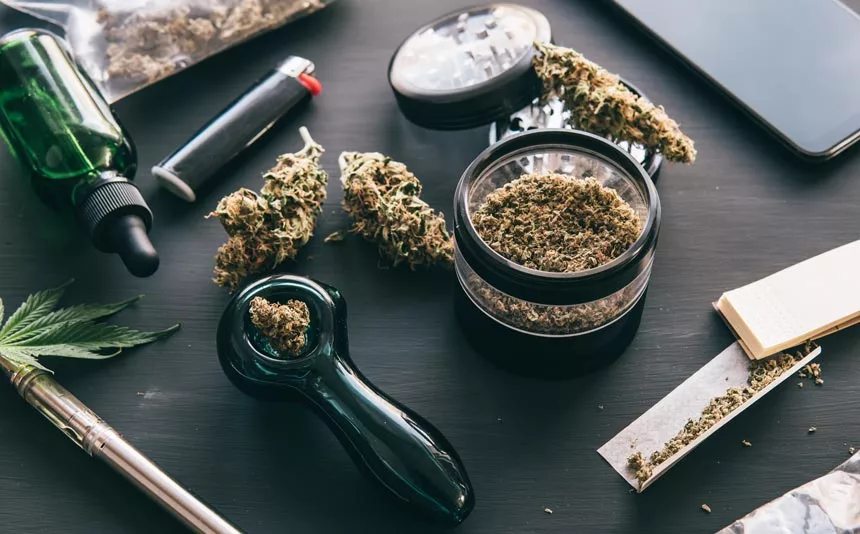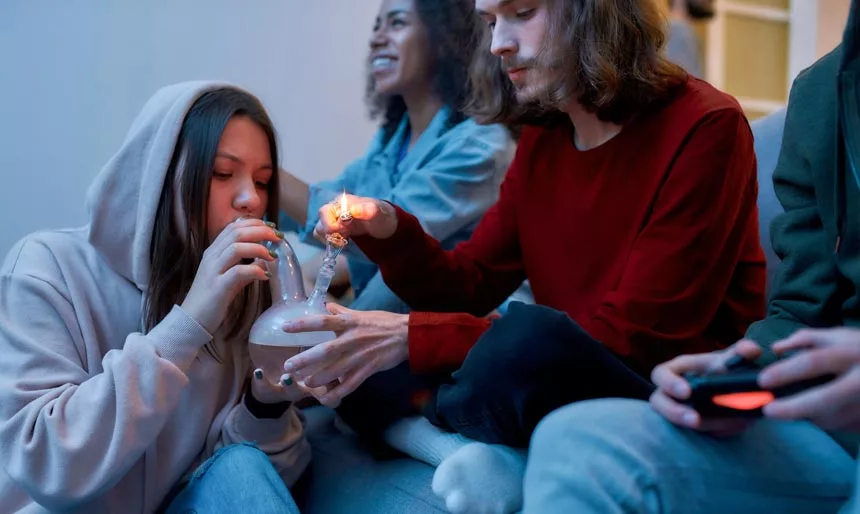In the middle of an opioid overdose epidemic and a period where weed is nearly legal everywhere, many newcomers and other curious parties wonder: can you overdose on weed?
The short answer: No.
The long answer: The active ingredient in marijuana, THC, is non-fatal.
If you smoke enough weed to get very high, you will likely feel sick, start to hallucinate, and lose your balance — but you won’t die.
So why do so many people think they can overdose on weed? It’s partly because you can have an adverse reaction to marijuana, just like any other substance. You could have an allergic reaction to THC or eat too much of a potent edible and find yourself in the ER (though this is rare).
But even if those things don’t happen, smoking enough weed can make you feel like crap. That doesn’t mean it will kill you — but it does mean that it’s not healthy for your body to consume so much THC all at once (or at all).
Weed Does Have Its Own Risks
Table of Contents
- Weed Does Have Its Own Risks
- What is Marijuana Toxicity?
- Do You Know How to Recognize An Overdose?
- What Happens When You Overdose on Weed?
- Can You Overdose on Marijuana Edibles?
- How Do You Overdose on Weed?
- Marijuana Overdoses and Children
- How Long Does Weed Stay in Your System?
- How to Stop Feeling High When You’ve Consumed Too Much Marijuana?
- Are More People Smoking Weed Now Than in Years Past?
- Most Common Fears for Marijuana Overdose
- Find Addiction Rehabs for Marijuana Abuse and Addiction Now
- Medically Reviewed By
Using marijuana does have its own set of risks involved. The number of risks is pretty high and incorporates several elements of danger. This post will discuss what happens when you consume too much marijuana.
The first thing is that you can get addicted to it. Even though there are no physical withdrawal symptoms, your brain will become accustomed to the cannabinoids in the drug and will start to crave them when they are not present. This is called tolerance, and it can lead to an addiction to marijuana.
While this may sound strange since many people consume large amounts of marijuana without becoming addicted, there are indeed some people who do develop an addiction due to their use of the drug. Some would like to quit but find themselves unable to do so due to their addiction.
Another risk associated with consuming too much marijuana is that it can cause paranoia and anxiety in some people if consumed in large amounts. These feelings may be temporary or last for a few hours, but they can be frightening while driving or performing other tasks that require concentration and focus (such as schoolwork).
Marijuana intoxication may also cause a distorted perception of reality, making it difficult for someone who has been using it for a long time to maintain mental wellness. Smoking too much pot is associated with schizophrenia and certain identity disorders.
What is Marijuana Toxicity?
It turns out that even though you can’t overdose and die from smoking weed, technically, over-using it can be considered an overdose, otherwise known as marijuana toxicity. What are the worst things that can happen when you overdose on weed?
Do You Know How to Recognize An Overdose?
When someone overdoses on any substance, there are usually some telltale signs that something is wrong. If the person in question starts acting bizarrely or in a way that seems inappropriate for their situation, there’s a good chance they’re suffering from an overdose.
This is especially true for more dangerous drugs like heroin or cocaine, where users often experience unconsciousness and death. But marijuana doesn’t have any of these symptoms — making it difficult to recognize when someone has overdosed on cannabis rather than just gotten high from smoking too much pot at once.
What Happens When You Overdose on Weed?
Since there’s no medical classification for a “marijuana overdose” or uniform set of symptoms, it’s difficult to say what someone overdosing on weed looks like. There’s no gradual progression through steps like a heroin or fentanyl overdose.
However, if you dig deep enough, you can find some documented cases of deaths associated with marijuana toxicity. Consider the following quote and the subsequent marijuana death case.
“You can’t die from an overdose of cannabis alone,” said Dr. Philip Blair, MD, a psychiatrist at the University of Colorado School of Medicine specializing in addiction and substance abuse disorders. “However, if you mix it with alcohol or other drugs, the risk increases.”
In one case study published by the New England Journal of Medicine in 2006, researchers described a 19-year-old woman who accidentally took too much marijuana and died from asphyxiation. The woman had been smoking marijuana while drinking beer with friends when she passed out and stopped breathing.
Her friends tried to revive her by performing CPR but were unsuccessful because they didn’t know how long she was unconscious or what kind of coma she was in (there are several types). When paramedics arrived on the scene, they found that she had no pulse or respiration, and they could not revive her either.
Later that day, she was pronounced dead at the hospital due to acute respiratory failure following an apparent drug overdose (cannabis was confirmed).
Can You Overdose on Marijuana Edibles?
According to the National Institute on Drug Abuse (NIDA), there have been no reported deaths from consuming too much marijuana alone. While this may be true when comparing the amount of THC found in cannabis products today versus those from decades ago, it’s not to say that ingesting too much pot doesn’t have serious health effects.
For example, if you consume too much edible marijuana, it could lead to an anxiety attack or even hallucinations — especially if you’re prone to these reactions or have a history of mental illness like schizophrenia or bipolar disorder.
Is It More Dangerous to Overdose On Edible Marijuana Or Smoking It?
Although it’s difficult to overdose on a single dose of edible marijuana, smoking pot will put your body at risk of overdosing because smoking anything increases your heart rate and blood pressure.
However, edibles aren’t very safe either. Because there’s no way to gauge exactly how much marijuana or THC you’re introducing to your body, it could be extremely easy to overdose.
How Do You Overdose on Weed?
The most common way people accidentally overdose on weed is by overeating edible cannabis products. Edibles are made with concentrated cannabis oil or other forms of THC and come in various shapes and sizes — cookies, brownies, and candy bars are just some of the options available at dispensaries and medical marijuana centers.
Most edibles contain 10 milligrams of THC per serving (some have up to 100 milligrams), so it takes time for the effects of ingestion to kick in — anywhere from 30 minutes to two hours after consumption, depending on how quickly you metabolize THC (if you’re new to consuming edibles). A lot depends on your tolerance level and how much food you have consumed before taking an edible (which can slow down the onset).
Marijuana Overdoses and Children
When a person smokes marijuana, THC enters the bloodstream directly through the lungs and travels to the brain quickly. A person can also get high by eating or drinking foods that contain marijuana or inhaling its vapors over time.
When marijuana is smoked by itself, it does not cause long-term health problems for most people who use it once in a while (less than once a week). Used habitually, it can begin causing significant issues.
However, research has shown that regular marijuana users might experience some health problems such as lung problems like asthma attacks or bronchitis due to its irritant properties; heart problems like an irregular heartbeat; memory loss; weight gain; difficulty with thinking clearly; impaired reaction time; difficulty with problem-solving skills; reduced ability to plan ahead; and other issues.
These issues make marijuana and marijuana overdose a growing concern for children. Significant learning issues can arise in children and teens who abuse marijuana during developmental stages.
You’re probably mistaken if you think your teenager hasn’t tried marijuana.
Marijuana is the most commonly used illicit drug in the world. The National Institute on Drug Abuse estimates that more than 22 million Americans use marijuana regularly. According to NIDA, nearly 50 percent of all U.S. 12th graders have tried marijuana at least once, and close to 10 percent use it every month.
So, how much marijuana does it take for a child to overdose?
It’s a question that many parents are asking themselves this week.
The answer, however, is not so straightforward. While there are a lot of variables at play, the consensus is that it takes a lot of weed to overdose on marijuana. Because children and teens are more minor than adults, it takes quite a bit less for them to hit their toxicity level.
How Long Does Weed Stay in Your System?
Drug tests can detect THC, the primary psychoactive ingredient in marijuana, for days, weeks, or even months after you consume it. The exact length of time varies from person to person, depending on how much cannabis was consumed and how often.
If you stop smoking weed altogether and never touch it again, most cannabinoids will leave your body within 30 days. But if you’re an occasional user who smokes once a week or less, the time it takes for THC and other cannabinoids to clear may surprise you.
As soon as you smoke weed, THC enters the bloodstream through the lungs and travels to organs throughout the body, including brain cells. The drug rapidly passes through fatty tissues in the body — including fat cells under your skin — which helps explain why people look so puffy when consuming edibles or drinking too much alcohol. Once it gets into your bloodstream, THC turns into another type of cannabinoid called 11-hydroxy-THC (11-OH).
This metabolite is more potent than regular THC because it’s been “strained” by the body and contains pure THC content. From that point, it takes the body about 30 days to eliminate marijuana from the urine, but other body systems are a different story.
It stays in the blood for about four days, but the hair keeps traces of marijuana for much longer. It can take even small follicles of hair months to rid themselves of all traces of THC, which is why this test is used by probation officers who want to look back further into someone’s past.
How to Stop Feeling High When You’ve Consumed Too Much Marijuana?
If you’ve ever been high, then it’s likely that you’ve experienced a scenario where you’ve overeaten marijuana. That’s no different from any other edible, of course, but in the case of weed, it can be incredibly unpleasant and lead to some pretty nasty side effects.
The good news is that there are ways to stop feeling high when you’ve consumed too much marijuana. We’ll go over some of those methods below to better understand what to do if you or someone else becomes too intoxicated on marijuana.
The Causes of Getting Too High from Marijuana
Marijuana affects everyone differently, but there are some common causes for getting too high from smoking pot or eating edibles:
- You’re not used to consuming cannabis
- You’re consuming an edible that has more THC than advertised
- You’re consuming an edible with less THC than advertised
If you feel like you’ve become too high, things can get pretty uncomfortable. The best way to get through it is to lay back and focus on your breathing. Take deep, heavy breaths, counting to five before letting out a big exhale.
This keeps your attention on your breathing and doesn’t allow your mind to wander and cause panic. After about 15 minutes, you should begin to feel better. Continue breathing until your heart rate has slowed considerably. If it helps, grab a glass of water, so you don’t become dehydrated.
Are More People Smoking Weed Now Than in Years Past?
Are more people smoking weed now than at any other time in history?
According to the latest statistics from the National Survey on Drug Use and Health (NSDUH), the answer to that question is yes. More than 22 million Americans aged 12 or older used marijuana for the first time in 2016, up from nearly 19 million new users in 2015. This is the highest number of new marijuana users recorded since 1985.
Of course, there was a time when people were convinced that marijuana would cause insanity and psychosis, but today we know that it’s not as dangerous or addictive as we once thought. Even though there are some risks associated with using marijuana (especially if you’re young), there’s no evidence that it causes any long-term harm or leads to harder drugs like heroin or cocaine.
So, what does that mean for your health? For starters, it means that more potent marijuana is available than in the past.
This increases your odds of experiencing marijuana toxicity because of the high amount of THC contained in pot now. Additionally, offshoots of marijuana are available and more popular, leading to more chances of an overdose.
Things like hash, wax, and oil contain THC in significant doses (upwards of 80 and 90%) and pose a risk to someone who isn’t used to a powerful product. In the end, the only natural way to avoid overdosing on marijuana is by avoiding it altogether.
Most Common Fears for Marijuana Overdose
One of the most frightening things looming over the marijuana culture today is that weed has been surfacing with traces of fentanyl. These fentanyl-laced batches have been responsible for several deaths at music festivals all around the country.
What makes this even scarier is that fentanyl is odorless and tasteless, especially when compared to the pungent smell of marijuana and the darker color. It would be nearly impossible to detect trace amounts of fentanyl on weed, which can be enough to kill someone in most cases.
If you or someone you know is struggling with marijuana use disorder, you must understand you have options for receiving help.
Find Addiction Rehabs for Marijuana Abuse and Addiction Now
If you’re struggling with marijuana abuse or know someone who is, there are plenty of options for help. If you’re uncertain about where to get help, Find Addiction Rehabs has one of the most extensive dashboards for finding treatment facilities.
You’ll have an opportunity to navigate searches for rehabs based on your insurance, your drug of choice, your location, and even the type of treatment you’re looking for. The convenience of having all of this information located in a central dashboard makes finding the best treatment options for you more accessible than ever.
If you’re ready to start your journey to recovery, finding a facility is the first step. Visit Find Addiction Rehabs today to begin your search.
Brandon is a highly skilled content writer and behavioral health marketer with over a decade of experience. In his own words: in my work with Find Addiction Rehabs, I have dedicated my expertise to a cause close to my heart – substance abuse recovery. Through my passion for the field, I’ve successfully compiled a track record of crafting compelling content that educates, inspires, and supports those on their recovery journeys.



